Book contents
- Race in American Literature and Culture
- Cambridge Themes in American Literature and Culture
- Race in American Literature and Culture
- Copyright page
- Contents
- Contributors
- Acknowledgments
- Introduction
- Part I Fractured Foundations
- Part II Racial Citizenship
- Part III Contending Forces
- Part IV Reconfigurations
- Part V Envisioning Race
- Chapter 15 Picturing Race
- Chapter 16 “The Man That Was a Thing”
- Chapter 17 Locating Race
- Chapter 18 De-forming and Re-making
- Part VI Case Studies
- Part VII Reflections and Prospects
- Index
Chapter 17 - Locating Race
from Part V - Envisioning Race
Published online by Cambridge University Press: 26 May 2022
- Race in American Literature and Culture
- Cambridge Themes in American Literature and Culture
- Race in American Literature and Culture
- Copyright page
- Contents
- Contributors
- Acknowledgments
- Introduction
- Part I Fractured Foundations
- Part II Racial Citizenship
- Part III Contending Forces
- Part IV Reconfigurations
- Part V Envisioning Race
- Chapter 15 Picturing Race
- Chapter 16 “The Man That Was a Thing”
- Chapter 17 Locating Race
- Chapter 18 De-forming and Re-making
- Part VI Case Studies
- Part VII Reflections and Prospects
- Index
Summary
In American Indian terms, “survival” (or the more frequently cited Derridean term “survivance,” commandeered by Anishinaabe writer and critic Gerald Vizenor to denote active tribal presencing) implies a willed immunity to the geographical, political, and economic coordinates that define the settler state and overwrite tribal precedence. Such invocations of sovereignty function mainly as intellectual or artistic aspirations rather than lived conditions. The bracing distinctiveness of the South is its magnification of racial separatism and intersectionality all at once – a clash that further highlights the anomalous position of the Indian, banished strategically from an intimate biracial order, and yet locked permanently and in fact produced within those genealogies. Put another way, the primal site of the US plantation, and with it the birth of racial capitalism in the American context, fundamentally relies on the irrelevance and erasure of Indians – and yet it continues to implicate, resurrect, indict, and appropriate their substance at nearly every turn, making them an indelible (if functionally illegible) component of a racialized economy. As a result, “Indians” are simply everywhere and nowhere in the southern narrative.
- Type
- Chapter
- Information
- Race in American Literature and Culture , pp. 276 - 291Publisher: Cambridge University PressPrint publication year: 2022



